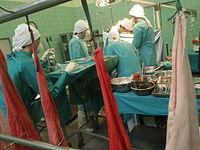
Photo from wikipedia
An improved method for solid-phase extraction (SPE)-liquid chromatography-tandem mass spectrometry was developed to analyze eight monoalkyl phthalate esters (MPEs) in eight different kinds of porcine tissues. The tissue samples were… Click to show full abstract
An improved method for solid-phase extraction (SPE)-liquid chromatography-tandem mass spectrometry was developed to analyze eight monoalkyl phthalate esters (MPEs) in eight different kinds of porcine tissues. The tissue samples were processed using enzymatic deconjugation with β-glucuronidase, followed by SPE with Oasis MAX cartridges. A pentafluorophenyl column was first used to solve the coeluting issues of MPE isomers. The limits of detection and recoveries were 0.01-0.6 ng/g and 62.5-123.7%, respectively. The intra- and interday precisions were less than 7.1 and 9.4%, respectively. The robust method was successfully applied for the investigation of MPEs in various porcine tissue samples collected from markets in Beijing, China. The occurrence of MPEs with total concentrations of 48.0-108 ng/g was detected, and monoethylhexyl phthalate was the predominant MPE (accounting for 30-57%) in all of the porcine tissue samples. The results will be helpful in assessing the potential risks of diets that include pork.
Journal Title: Journal of agricultural and food chemistry
Year Published: 2019
Link to full text (if available)
Share on Social Media: Sign Up to like & get
recommendations!